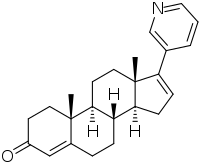Δ4-Abiraterone
Δ4-Abiraterone (D4A; code name CB-7627), also known as 17-(3-pyridyl)androsta-4,16-dien-3-one, is a steroidogenesis inhibitor and active metabolite of abiraterone acetate, a drug which is used in the treatment of prostate cancer and is itself a prodrug of abiraterone (another active metabolite of abiraterone acetate).[1] D4A is formed from abiraterone by 3β-hydroxysteroid dehydrogenase/Δ5-4 isomerase (3β-HSD).[1] It is said to be a more potent inhibitor of steroidogenesis than abiraterone, and is partially responsible for the activity of abiraterone acetate.[1]
 | |
| Clinical data | |
|---|---|
| Other names | D4A; CB-7627; 17-(3-Pyridyl)androsta-4,16-dien-3-one |
| Identifiers | |
IUPAC name
| |
| CAS Number | |
| PubChem CID | |
| ChemSpider | |
| Chemical and physical data | |
| Formula | C24H29NO |
| Molar mass | 347.502 g·mol−1 |
| 3D model (JSmol) | |
SMILES
| |
InChI
| |
D4A is specifically an inhibitor of CYP17A1 (17α-hydroxylase/17,20-lyase), 3β-HSD, and 5α-reductase.[1] In addition, it has also been found to act as a competitive antagonist of the androgen receptor (AR), with potency reportedly comparable to that of enzalutamide.[1] However, the initial 5α-reduced metabolite of D4A, 3-keto-5α-abiraterone, is an agonist of the AR, and has been found to stimulate prostate cancer progression.[2] The formation of this metabolite can be blocked by the coadministration of dutasteride, a selective and highly potent 5α-reductase inhibitor, and the addition of this medication may improve the effectiveness of abiraterone acetate in the treatment of prostate cancer.[2]
References
- Li Z, Bishop AC, Alyamani M, Garcia JA, Dreicer R, Bunch D, Liu J, Upadhyay SK, Auchus RJ, Sharifi N (July 2015). "Conversion of abiraterone to D4A drives anti-tumour activity in prostate cancer". Nature. 523 (7560): 347–51. doi:10.1038/nature14406. PMC 4506215. PMID 26030522.
- Li Z, Alyamani M, Li J, Rogacki K, Abazeed M, Upadhyay SK, Balk SP, Taplin ME, Auchus RJ, Sharifi N (May 2016). "Redirecting abiraterone metabolism to fine-tune prostate cancer anti-androgen therapy" (PDF). Nature. 533 (7604): 547–51. doi:10.1038/nature17954. PMID 27225130.